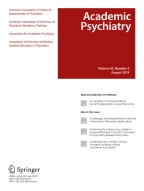Abstract
Objective
The practice of medicine is inherently uncertain. We sought to measure the level of psychological distress among medical students and to ascertain if an intolerance of uncertainty and ambiguity were associated with distress.
Method
The authors conducted a cross-sectional study with a population consisting of 4th year undergraduate medical students at an Irish university. Psychological distress was measured with the GHQ-12 scale. The “tolerance of ambiguity” scale and the “Intolerance of Uncertainty Scale (IUS)-12” were used to measure the respective variables.
Results
One hundred students (class size of 123) participated in this study giving a response rate of 81 %. A total of 27 % of the students met the criteria for psychological distress. Student psychological distress, as measured by GHQ-12 caseness, was associated with a higher intolerance of uncertainty (mean 31.70 (6.18)) compared with those who were not distressed (mean IUS score 26.66 (6.58)) (t (98) = −5.52, p < 0.001).
Conclusion
A relative lack of tolerance for uncertainty may prove to be an important predictor of psychological distress in undergraduates. There is an argument for designing appropriate interventions so that learners can come to recognize and embrace uncertainty rather than its remaining unacknowledged and potentially contributing to psychological morbidity.
Similar content being viewed by others
References
Dyrbye LN, Thomas MR, Shanafelt TD. Systematic review of depression, anxiety, and other indicators of psychological distress among U.S. and Canadian medical students. Acad Med. 2006;81(4):354–73.
Dahlin M, Joneborg N, Runeson B. Stress and depression among medical students: a cross-sectional study. Med Educ. 2005;39(6):594–604.
Baykan Z, Naçar M, Çetinkaya F. Depression, anxiety, and stress among last-year students at Erciyes University Medical School. Acad Psychiatry. 2012;36(1):64–5.
Young C, Fang D, Golshan S, Moutier C, Zisook S. Burnout in premedical undergraduate students. Acad Psychiatry. 2012;36(1):11–6.
Moffat KJ, McConnachie A, Ross S, Morrison JM. First year medical student stress and coping in a problem-based learning medical curriculum. Med Educ. 2004;38(5):482–91.
Guthrie EA, Black D, Shaw CM, Hamilton J, Creed FH, Tomenson B. Embarking upon a medical career: psychological morbidity in first year medical students. Med Educ. 1995;29(5):337–41.
Atkinson P. Training for certainty. Soc Sci Med. 1984;19(9):949–56.
Fox R. Training for certainty. In: Merton R, Reader G, Kendall P, editors. The student–physician: introductory studies in the sociology of medical education. Cambridge: Harvard University Press; 1980.
Coles C. Uncertainty in a world of regulation. Adv Psychiatr Treat. 2006;12(6):397–401.
Kassirer JP. Our stubborn quest for diagnostic certainty. A cause of excessive testing. N Engl J Med. 1989;320(22):1489–91.
Hall KH. Reviewing intuitive decision-making and uncertainty: the implications for medical education. Med Educ. 2002;36(3):216–24.
Beresford EB. Uncertainty and the shaping of medical decisions. Hastings Cent Rep. 1991;21(4):6–11.
Budner S. Intolerance of ambiguity as a personality variable. J Pers. 1962;30:29–50.
Grenier S, Barrette A-M, Ladouceur R. Intolerance of uncertainty and intolerance of ambiguity: similarities and differences. Personal Individ Differ. 2005;39(3):593–600.
Dugas MJ, Gosselin P, Ladouceur R. Intolerance of uncertainty and worry: investigating specificity in a nonclinical sample. Cogn Ther Res. 2001;25(5):551–8.
Gentes EL, Ruscio AM. A meta-analysis of the relation of intolerance of uncertainty to symptoms of generalized anxiety disorder, major depressive disorder, and obsessive-compulsive disorder. Clin Psychol Rev. 2011;31(6):923–33.
Goldberg D, Williams P. A user’s guide to the general health questionnaire. Windsor: NFER-Nelson; 1991.
Goldberg DP, Gater R, Sartorius N, Ustun TB, Piccinelli M, Gureje O, et al. The validity of two versions of the GHQ in the WHO study of mental illness in general health care. Psychol Med. 1997;27(1):191–7.
Geller G, Faden RR, Levine DM. Tolerance for ambiguity among medical students: implications for their selection, training and practice. Soc Sci Med. 1990;31(5):619–24.
Sobal J, DeForge BR. Reliability of Budner’s Intolerance of Ambiguity Scale in medical students. Psychol Rep. 1992;71(1):15–8.
Benjamin A, Riggio R, Mayes B. Reliability and factor structure of Budner’s Tolerance for Ambiguity Scale. J Soc Behav Pers. 1996;11:625–32.
Wayne S, Dellmore D, Serna L, Jerabek R, Timm C, Kalishman S. The association between intolerance of ambiguity and decline in medical students’ attitudes toward the underserved. Acad Med. 2011;86(7):877–82.
Carleton RN, Norton MAPJ, Asmundson GJG. Fearing the unknown: a short version of the Intolerance of Uncertainty Scale. J Anxiety Disord. 2007;21(1):105–17.
Freeston MH, Rhéaume J, Letarte H, Dugas MJ, Ladouceur R. Why do people worry? Personal Individ Differ. 1994;17(6):791–802.
Birrell J, Meares K, Wilkinson A, Freeston M. Toward a definition of intolerance of uncertainty: a review of factor analytical studies of the Intolerance of Uncertainty Scale. Clin Psychol Rev. 2011;31(7):1198–208.
Guthrie E, Black D, Bagalkote H, Shaw C, Campbell M, Creed F. Psychological stress and burnout in medical students: a five-year prospective longitudinal study. J R Soc Med. 1998;91(5):237–43.
Kalra G, Bhugra DK, Shah N. Identifying and addressing stresses in international medical graduates. Acad Psychiatry. 2012;36(4):323–9.
Dugas MJ, Robichaud M. Cognitive-behavioral treatment for generalized anxiety disorder: from science to practice. Routledge: Chapman & Hall; 2007.
DeForge BR, Sobal J. Intolerance of ambiguity in students entering medical school. Soc Sci Med. 1989;28(8):869–74.
Ghosh AK. Understanding medical uncertainty: a primer for physicians. J Assoc Physicians India. 2004;52:739–42.
Merrill JM, Camacho Z, Laux LF, Lorimor R, Thornby JI, Vallbona C. Uncertainties and ambiguities: measuring how medical students cope. Med Educ. 1994;28(4):316–22.
Firth-Cozens J. Medical student stress. Med Educ. 2001;35(1):6–7.
Disclosures
The authors have no competing conflict of interest to report.
Author information
Authors and Affiliations
Corresponding author
Electronic Supplementary Material
Below is the link to the electronic supplementary material.
ESM 1
(DOCX 44 kb)
Rights and permissions
About this article
Cite this article
Lally, J., Cantillon, P. Uncertainty and Ambiguity and Their Association with Psychological Distress in Medical Students. Acad Psychiatry 38, 339–344 (2014). https://doi.org/10.1007/s40596-014-0100-4
Received:
Accepted:
Published:
Issue Date:
DOI: https://doi.org/10.1007/s40596-014-0100-4
